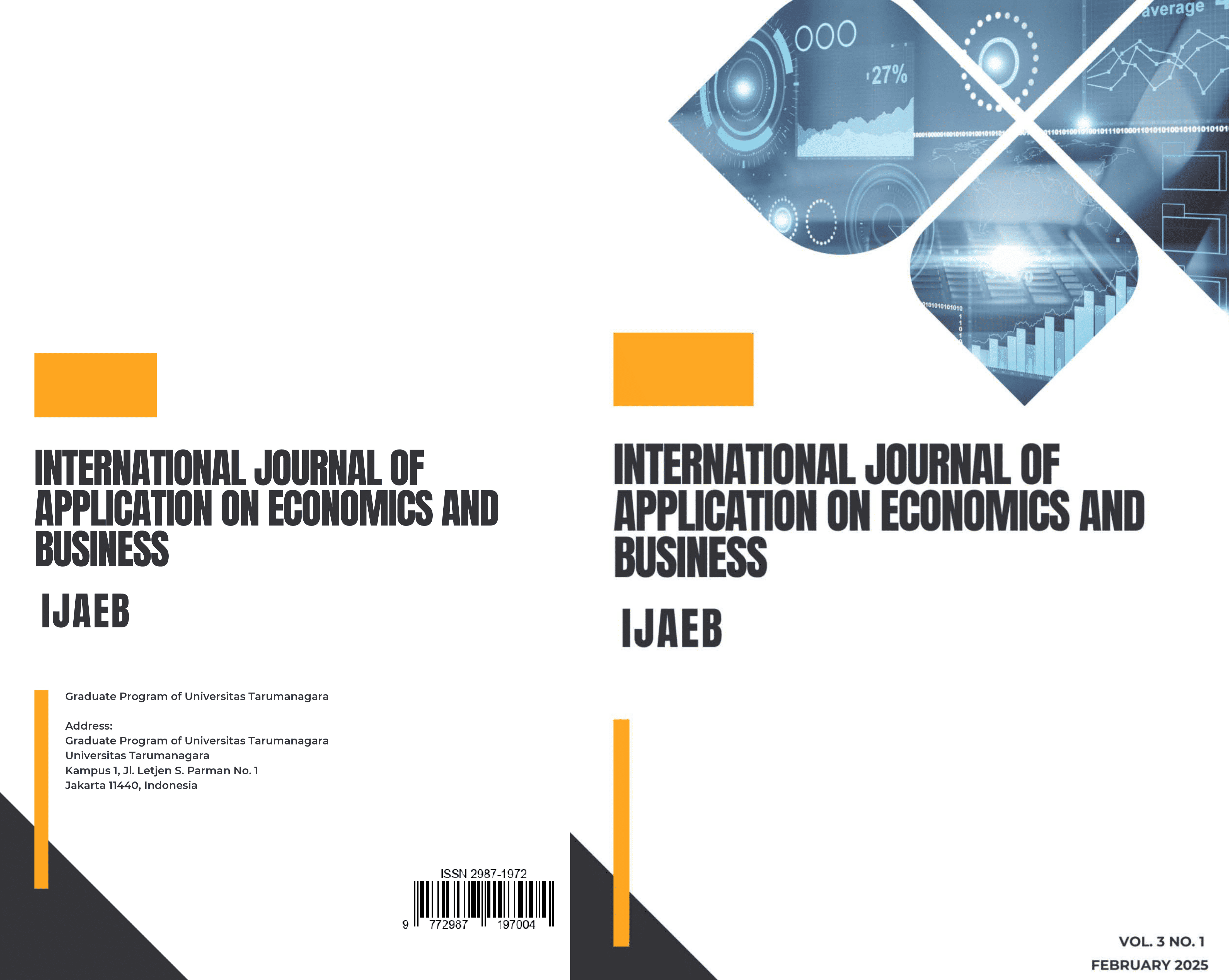EXPLORING CONTRIBUTION AND CHALLENGES TOWARDS SOCIOECONOMIC DEVELOPMENT IN BANGLADESH: THE CASE OF READY-MADE GARMENTS INDUSTRY
Main Article Content
Abstract
This study aims to explore stakeholders' perspectives on the contributions and challenges of the Ready-Made Garments (RMG) sector which lead to socioeconomic development in Bangladesh. This research employs a qualitative approach, utilizing interviews, surveys, and focus group discussions to collect data. Participants include factory owners, government officials, industry experts, workers' representatives, and economists. The study finds that the RMG sector significantly contributes to poverty alleviation by providing employment opportunities, particularly for women and rural migrants. Employment in the sector enhances household incomes and promotes socioeconomic mobility. Additionally, RMG exports constitute a substantial portion of Bangladesh's total export earnings, supporting macroeconomic stability and economic development. However, the sector faces significant challenges, including labor rights issues, poor working conditions, and intense global competition. These challenges hinder the sector's sustainability and require targeted interventions to improve labor standards and competitive positioning. Stakeholders emphasize the need for policy reforms, technological advancements, and capacity-building initiatives to address these challenges and enhance the sector's sustainable growth.
Article Details

This work is licensed under a Creative Commons Attribution-NonCommercial-ShareAlike 4.0 International License.
This journal provides immediate open access to its content on the principle that making research freely available to the public supports a greater global exchange of knowledge.
IJAEB by Graduate Program of Universitas Tarumanagara is licensed under a Creative Commons Attribution-NonCommercial-ShareAlike 4.0 International License.. Permissions beyond the scope of this license may be available at https://journal.untar.ac.id/index.php/ijaeb
References
Acemoglu, D., Johnson, S., & Robinson, J. A. (2005). Institutions as a fundamental cause of long-run growth. In P. Aghion & S. N. Durlauf (Eds.), Handbook of Economic Growth (Vol. 1, Part A, pp. 385-472). Elsevier.
Agwu, M. E., & Onwuegbuzie, H. N. (2018). Effects of international marketing environments on entrepreneurship development. Journal of Innovation and Entrepreneurship, 7, 12.
Ahlquist, J. S., & Mosley, L. (2021). Firm participation in voluntary regulatory initiatives: The Accord, Alliance, and US garment importers from Bangladesh. The Review of International Organizations, 16(2), 317–343.
Al Mamun, A. M., & Hoque, M. (2022). The impact of paid employment on women's empowerment: A case study of female garment workers in Bangladesh. World Development Sustainability, 1, 100026.
Ansary, M. A., & Barua, U. (2015). Workplace safety compliance of RMG industry in Bangladesh: Structural assessment of RMG factory buildings. International Journal of Disaster Risk Reduction, 14(4), 424-437.
Arejiogbe, O. E., Moses, C. L., Salau, O. P., Onayemi, O. O., Agada, S. A., Dada, A. E., & Obisesan, O. T. (2023). Bolstering the impact of social entrepreneurship and poverty alleviation for sustainable development in Nigeria. Sustainability, 15, 6673.
Collette van Der Ven. (2015). Where trade and industrial policy converge: How developing countries can utilize trade preferences to generate sustainable, local growth in the garment sector. The International Lawyer, 49(1).
Dwivedi, Y. K., et al. (2022). Metaverse beyond the hype: Multidisciplinary perspectives on emerging challenges, opportunities, and agenda for research, practice and policy. International Journal of Information Management, 66, 102542.
Farida, I., & Setiawan, D. (2022). Business strategies and competitive advantage: The role of performance and innovation. Journal of Open Innovation: Technology, Market, and Complexity, 8, 163.
Hart, K. (1973). Informal income opportunities and urban employment in Ghana. The Journal of Modern African Studies, 11(1), 61-89.
Hossain, M., & Alam, S. (2022). Impacts of COVID-19 on the garment sector of Bangladesh. American Journal of Industrial and Business Management, 12, 443-487.
Huang, Y., Sheng, L., & Wang, G. (2021). How did rising labor costs erode China’s global advantage? Journal of Economic Behavior & Organization, 183, 632-653.
Joseph, J., Katsos, J. E., & Daher, M. (2021). Local business, local peace? Intergroup and economic dynamics. Journal of Business Ethics, 173, 835–854.
Koty, A. C., & Zhou, Q. (2019). Minimum wages in China 2019. China Briefing. Retrieved from https://www.chinabriefing.com/news/minimum-wages-china-2019/.
Kumar, A., Moktadir, A., Liman, Z. R., Gunasekaran, A., Hegemann, K., & Khan, S. A. R. (2020). Evaluating sustainable drivers for social responsibility in the context of ready-made garments supply chain. Journal of Cleaner Production, 248, 119231.
Majchrowska, A., & Strawiński, P. (2018). Impact of minimum wage increase on gender wage gap: Case of Poland. Economic Modelling, 70, 174-185.
Matthew, O. A., Ede, C., Osabohien, R., Ejemeyovwi, J., Ayanda, T., & Okunbor, J. (2021). Interaction effect of tourism and foreign exchange earnings on economic growth in Nigeria. Global Business Review, 22(1), 7-22.
Michael E. Porter. (1980). Industry structure and competitive strategy: Keys to profitability. Financial Analysts Journal, 36(4), 30-41.
Mushtaq, M., Ahmed, S., Fahlevi, M., Aljuaid, M., & Saniuk, S. (2022). Globalization and employment nexus: Moderating role of human capital. PLOS ONE, 17(10), e0276431.
Nanyam, V. P. S., & Kumar, N. J. (2023). Modeling challenges affecting the performance of major ports of India. The Asian Journal of Shipping and Logistics, 39(3), 26-38.
Rathnayake, U., & Karunasena, G. (2015, December 7). Business ethics in apparel manufacturing: A literature review. 12th International Conference on Business Management (ICBM). https://ssrn.com/abstract=2699806
Sarker, M. M. I. (2018). Garments exports in Bangladesh. Social Scientist, 46(9–10), 61-70.
Shahajada, M., & Masrufa, A. (2019). Ready-made garments sector of Bangladesh: Its growth, contribution and challenges. Economics World, 7(1), 17-26.
Sharma, S. K., Srivastava, P. R., Kumar, A., et al. (2023). Supply chain vulnerability assessment for manufacturing industry. Annals of Operations Research, 326, 653–683.
Swazan, I. S., & Das, D. (2022). Bangladesh's emergence as a ready-made garment export leader: An examination of the competitive advantages of the garment industry. Journal of Global Business and Competitiveness, 17, 162-174.
Tarekul Islam, & Halim, M. A. (2022). Impact of ready-made garments (RMG) industries and sustainability: Perspective of the pandemic period in developing country. Cleaner Engineering and Technology, 11, 100567.
V.P.S.N Nanyam, & Kumar, N. J. (2023). Modeling challenges affecting the performance of major ports of India. The Asian Journal of Shipping and Logistics, 39(3), 26-38.
Yasmeen, K. (2023). Justice in the workplace: Islamic principles for wage determination. Islamic Economic Studies, 31(1/2), 43-87.
Yazawa, N. (2023). Dynamics of international trade: A 30-year analysis of key exporting nations. PLOS ONE, 18(8), e0289040.



